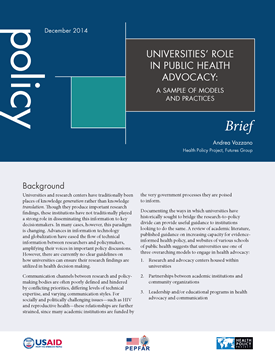The Health Policy Project ended in 2016. Work continued under Health Policy Plus (HP+) until 2022.
PUBLICATION
Author(s): Andrea Vazzano
Primary Language: English
Date: 12/12/2014
Abstract:
Universities and research centers have traditionally been places of knowledge generation rather than knowledge translation. Though they produce important research findings, these institutions have not traditionally played a strong role in disseminating this information to key decisionmakers. In many cases, this paradigm is changing. Advances in information technology and globalization have eased the flow of technical information between researchers and policymakers, amplifying their voices in important policy discussions. However, there are currently no clear guidelines on how universities can ensure their research findings are utilized in health decision making. Documenting the ways in which universities have sought to bridge the research-to-policy divide can provide useful guidance to institutions looking to do the same. This white paper, prepared by the Health Policy Project with support from USAID and PEPFAR, provides an overview of three models of university engagement in advocacy and examples of each approach. It also describes practices from non-educational institutions whose frameworks could be useful for linking research to policy or opportunities for partnerships. Finally, it identifies key points for universities to consider when designing an approach to health advocacy.
Advocacy Best Practices Brief Capacity Development Civil Society Engagement Governance, Stewardship & Accountability (GS&A) Leadership Non-Government/Community Service Org. (NGO/CSO) Policy Stakeholder Engagement Caribbean Region


